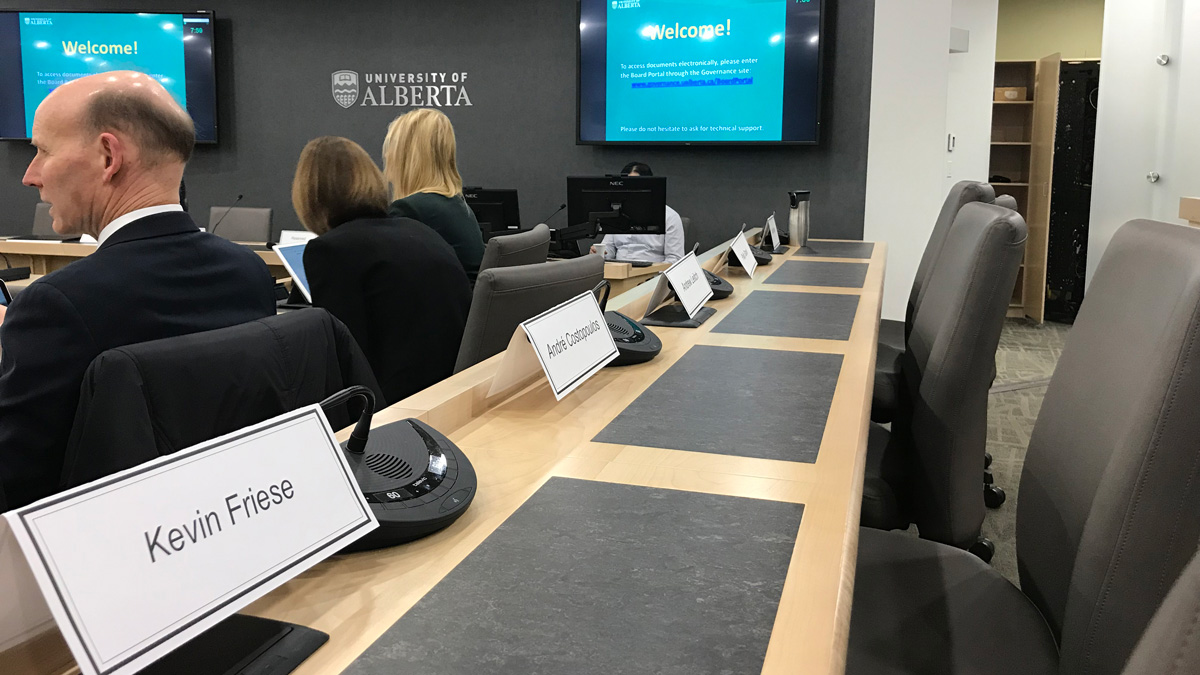 Sofia Osborne
Sofia OsborneThe 21 members of the University of Alberta Board of Governors hold near-absolute authority over the business and financial decisions of the institution. Board members are mandated by the Ministry of Education to serve the public interest and build relationships with the community, so citizens and students can be sure their tax and tuition dollars are being spent appropriately. Despite this mandate, the university’s governance office is determined to ensure that the discussions of the board are not made available to the public. The only information made public from Board meetings is the public minutes, which include only vague summaries of board discussion. The minutes do not name which Board members asked which questions or even list all the questions asked.
University governance has banned any recordings of board meetings, citing a Freedom of Information and Protection of Privacy Act (FOIP) policy guideline of the University Information and Privacy Office. The FOIP guidelines cited are specifically labeled as “Guidelines for Faculty and Staff,” not students. Governance office staff members patrol the room at board meetings, looking at observer’s phones and laptops to ensure no recordings are being made. The Governance Office also hires Protective Services (UAPS) Peace Officers to attend meetings based on another undocumented process, resulting in UAPS officers being present only at meetings students are likely to attend. When students are facing the threat of physical force being used by a UAPS officer to enforce Governance Office policies, observers are unlikely to feel safe questioning or challenging any directive of governance staff.
Students and members of the public should be able to understand how the board makes their decisions and who voted for which motion. A notice posted on the Board of Governors website states that “Members of the University community and of the public are welcome to attend and observe the open sessions of meetings of the Board of Governors and its Standing Committees. Accredited members of the news media are also welcome.” In Canada, there are no laws prohibiting the recording of individuals in spaces where they do not have a reasonable expectation of privacy, and the university itself states that Board meetings are open to the public. The Alberta Health Services board, another large public agency board appointed by the Government of Alberta, livestreams all their meetings and makes video archives available to the public. It is hard to understand how university governance can use FOIP to justify a ban on recordings when other Alberta agencies, boards, and commissions are recording and publishing the proceedings of their board meetings without issue.
University governance has also banned signage and placards at all meeting, without any written policy justifying this ban. The only way a student holding a reasonably-sized sign could disrupt a meeting is if Board members felt guilty after seeing first-hand how students will be affected by their decisions. The governance office is making up rules and regulations on the fly and enforcing them without passing written policies through appropriate governance channels. It’s ironic that the Governance Office is practicing such poor governance.
There is little explanation for the decisions made by university governance. The only clear goal of their actions is to ensure as little information about the Board and the decisions of its members are made available to the public. If the Board of Governors wishes to be unaccountable and opaque, why hide it? The Board should openly pass a policy banning recordings, signage, and limiting public access to meetings if Board members do not want the public to be able to question their decisions. Operating under policies that don’t exist is unacceptable.




